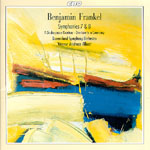Bernard Frankel (1906-73) had major careers in both film and concert music. In the former, he is best known for his score to the classic war film Battle of the Bulge. In the latter, he was a diverse and prolific composer of chamber and orchestral music, including a cycle of eight symphonies. With the exception of A Shakespeare Overture, which was premiered in 1956, all the music on this disc comes from the early 1970s. Frankel’s musical language is very much of its time (like that of William Schumann and Michael Tippett), basically atonal but with a strong melodic impetus, and exhibiting a continuous search for new orchestral sonorities and modes of expression. What at first seems an unvaryingly gray-hued sonic palette on repeated listening becomes a fascinating exploration of “new” musical territory, where the ear is ever stimulated and the mind intrigued by the next inventive instrumental texture or chord progression.
Both Symphonies No. 7 (1970) and No. 8 (1971) are in four movements, each starting with slowish first movements followed by quick allegros. The Eighth is the more overtly dramatic of the two and contains many passages reminiscent of the cinema, while the Seventh is somewhat colder and more consistent in mood. Throughout both works Frankel displays his brilliant orchestral writing, with many arresting passages for brass. The powerful Overture to a Ceremony (1970) opens with a crushing brass chord combined with chimes and bass drum that sets the stern, martial tone of the piece. Though cut from the same cloth as the symphonies, the Overture follows a more compact musical argument and therefore is easier to follow the first time around. A Shakespeare Overture was completed just before Frankel adopted his serial method of composition, though I would hesitate to call it tonal. Nonetheless, it is another fine piece of writing, but any preconceptions based on the title are likely to be frustrated, for there is nothing Elizabethan about this music. Rather, it is the essence of the dramatic that the composer conveys though its varied episodes.
It’s no surprise that conductor Werner Andreas Albert would excel in this complex and challenging music, after his enormously successful Hindemith cycle (also on CPO). Albert illuminates the important motives of Frankel’s constantly shifting harmonic patterns with astonishing clarity and precision, aided by the polished and powerful playing of the Queensland Symphony Orchestra. CPO’s recording is clear and full-sounding, but can take on a harsh edge in the tuttis. This collection is definitely not “easy listening”, but one that for those with curiosity and patience will yield many rewards.
































